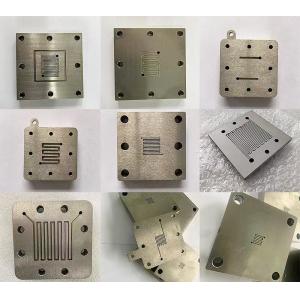Product Name: Bipolar Plate
Application: Hydrogen production via water electrolysis, new energy batteries,
hydrogen-generating fuel cells
Material: Titanium, Stainless Steel, Copper, Nickel
Titanium Purity: 99.7%
Grade: GR1 / GR2
Specification: Custom according to drawings
Processing Method: CNC / Etching
1. Production Process of Titanium Bipolar Plates
Titanium bipolar plates are essential components in PEM fuel cells and PEM water electrolyzers. They are responsible for distributing gases/liquids, conducting
electricity, and supporting the membrane-electrode assembly. The
production process involves several key steps:
1.1. Raw Material Selection
Material: Commercially pure titanium (e.g., Grade 1 or Grade 2) or titanium
alloys.
Thickness: Typically ranges from 0.1 mm to 1 mm depending on application.
1.2. Surface Pretreatment
1.3. Flow Field Forming
Flow channels are designed to manage the flow of gases or liquids.
Common forming methods include:
(a) Stamping
High-speed forming using precision dies.
Suitable for mass production.
Requires durable and high-cost molds.
(b) Roll Forming
(c) Chemical Etching
Precise patterning via photolithography and acid etching.
Best for complex or fine structures.
Higher cost and involves chemical waste management.
(d) Laser or EDM Machining
1.4. Welding (For Assembly)
Two patterned titanium sheets may be joined to create a sealed
bipolar plate:
1.5. Surface Coating Treatment
Titanium tends to form a non-conductive oxide layer (TiO₂), which
affects electrical performance. Surface coatings are applied to
improve conductivity and corrosion resistance.
Typical Coating Types:
Carbon-based Coatings: Graphene, carbon nanotubes.
Noble Metals: Platinum or gold (excellent conductivity and corrosion
resistance, but costly).
Conductive Ceramics: Titanium nitride (TiN), niobium nitride (NbN).
1.6. Quality Testing
Gas Tightness Test: To ensure sealing.
Electrical Conductivity Test
Corrosion Resistance Testing
Dimensional Accuracy Inspection
2. Applications of Titanium Bipolar Plates
Titanium bipolar plates are used in various electrochemical
systems, including:
2.1. Proton Exchange Membrane Water Electrolyzers (PEMWE)
2.2. PEM Fuel Cells (PEMFC)
2.3. Electrolytic Cells
3. Advantages of Titanium Bipolar Plates
| Advantage | Description |
|---|
| Excellent Corrosion Resistance | Ideal for acidic and high-voltage environments. |
| Lightweight | Titanium has a low density (4.5 g/cm³), reducing overall system
weight. |
| High Strength | Offers good mechanical strength and pressure resistance. |
| Thermal Conductivity | Facilitates efficient heat management within fuel cell stacks. |
| Long Service Life | Significantly longer lifespan compared to stainless steel or coated
materials. |
| Flexible Manufacturing | Compatible with various forming and coating techniques, including
high-precision methods. |
4. Challenges
While titanium bipolar plates have many advantages, some challenges
include:
High Material Cost: Titanium and its coatings are expensive.
Processing Difficulty: Titanium is harder to form and machine than steel.
Surface Conductivity Needs Optimization: Natural oxide layer requires effective surface treatment to
maintain conductivity.











